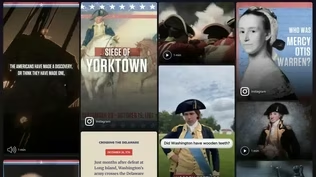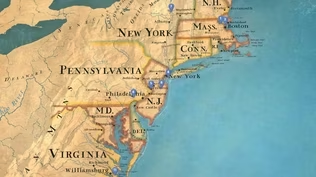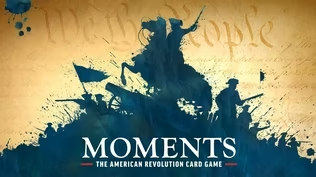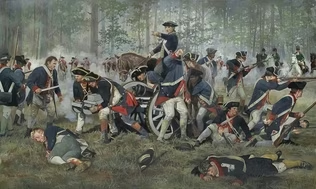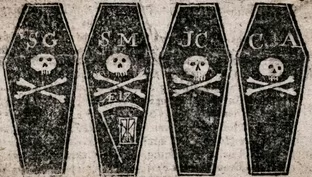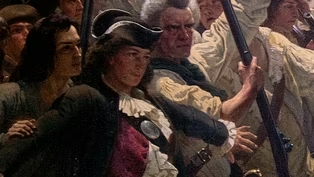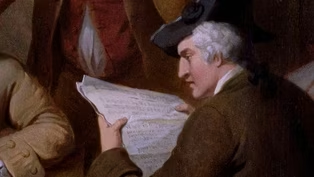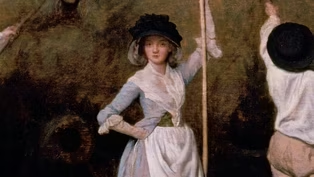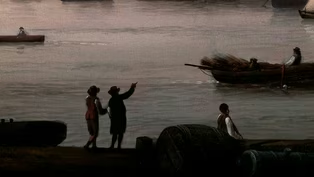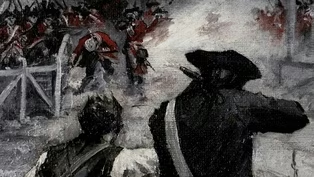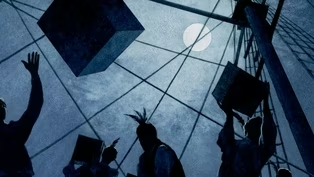
Liberty for Whom? Slavery, Protest and the Ideals of the Revolution
Clip: Episode 1 | 7m 32sVideo has Closed Captions
The revolutionary ideals of liberty spread across the colonies while many suffer from enslavement.
Committees of Correspondence form in hundreds of Massachusetts towns linking advocates of resistance and spreading the message and ideals of revolution. Eventually, the network spans into all colonies. While revolutionaries praise liberty, thousands suffer under the bondage of slavery including Phillis Wheatley, who becomes the first African American writer to publish a book while enslaved.
Problems playing video? | Closed Captioning Feedback
Problems playing video? | Closed Captioning Feedback
Episodes presented in 4K UHD on supported devices. Corporate funding for THE AMERICAN REVOLUTION was provided by Bank of America. Major funding was provided by The Better Angels Society and...

Liberty for Whom? Slavery, Protest and the Ideals of the Revolution
Clip: Episode 1 | 7m 32sVideo has Closed Captions
Committees of Correspondence form in hundreds of Massachusetts towns linking advocates of resistance and spreading the message and ideals of revolution. Eventually, the network spans into all colonies. While revolutionaries praise liberty, thousands suffer under the bondage of slavery including Phillis Wheatley, who becomes the first African American writer to publish a book while enslaved.
Problems playing video? | Closed Captioning Feedback
How to Watch The American Revolution
The American Revolution is available to stream on pbs.org and the free PBS App, available on iPhone, Apple TV, Android TV, Android smartphones, Amazon Fire TV, Amazon Fire Tablet, Roku, Samsung Smart TV, and Vizio.
Buy Now
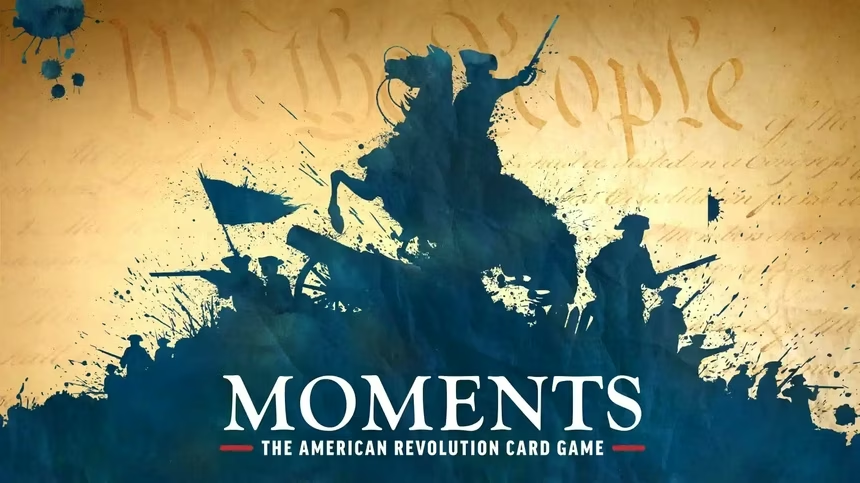
MOMENTS: The Revolutionary War Card Game
Use your knowledge of Revolutionary-era moments to build a timeline of real historical events.Providing Support for PBS.org
Learn Moreabout PBS online sponsorship[Clock ticking] Voice: Thomas Hutchinson, Governor of Massachusetts: There is now a disposition in all the colonies to let the controversy with the kingdom subside.
Hancock and most of the party are quiet and all of them abate of their virulence, except Samuel Adams.
[Hutchinson] Narrator: For 2 years, Samuel Adams kept up a steady stream of essays, in which he warned again and again that the lull was only temporary, that Parliament remained bent on imposing tyranny.
♪ Kamensky: Those who have interests in keeping the political story alive and growing, have to really work to keep it front and center, to define the problem as something present in the minds of ordinary people.
Why would I care about this as a--as a woman?
Why would I care about this as a small farmer?
[Sawing] Narrator: In 1772, events beyond Boston gave Adams the ammunition he needed to spread his radical message throughout the colonies.
In April, when a sawmill owner in New Hampshire was charged with commandeering pine trees earmarked for the masts of royal warships, a mob drove the British officials who came to arrest him out of town.
[Fireball] In June, when the "Gaspée," a British customs schooner, ran aground while chasing smugglers, angry Rhode Islanders set it afire.
And that fall, Adams learned that beginning the following year, the British Treasury would use the revenue from tea to pay the salaries of the most important Massachusetts officials, including all the colony's judges.
The judges' first loyalty would now be to the Crown, not the colonists.
There would be no way to ensure impartial justice.
Adams drafted a fiery response.
Voice: Among the natural rights of the colonists are these: First, a right to life; secondly, to liberty; thirdly to property; together with the right to support and defend them in the best manner they can.
[Samuel Adams] ♪ Narrator: Printed copies of his writings were sent to town meetings throughout the colony.
So-called Committees of Correspondence soon linked advocates of resistance in more than 100 Massachusetts towns and districts.
Eventually, their network would spread into other colonies.
Schiff: "Committees of Correspondence" is an effort to try to bring all of the colonies onto the same page, to make them feel as if they have a common cause, words which had really not been used before.
And it's through those committees that, essentially, the Revolutionary spirit diffuses itself throughout the colonies.
Voice: Let not the iron hand of tyranny ravish our laws and seize the badge of freedom.
Is it not high time for the people of this country explicitly to declare whether they will be freemen or slaves?
Samuel Adams.
Voice: I need not point out the absurdity of your exertions for liberty, while you have slaves in your houses.
If you are sensible that slavery is, in itself, and in its consequences, a great evil, why will you not pity and relieve the poor, distressed, enslaved Africans?
Caesar Sarter.
Kamensky: Slavery as a metaphor is in the conversation from the beginning.
Everywhere there's slavery, there are people thinking about freedom.
Nothing shows the desire for freedom like the struggles of subject peoples.
Voice: I, young in life, by seeming cruel fate Was snatch'd from Afric's fancy'd happy seat: What pangs excruciating must molest, What sorrows labour in my parent's breast?
Steel'd was that soul and by no misery mov'd That from a father seiz'd his babe belov'd: Such, such my case.
And can I then but pray Others may never feel tyrannic sway?
Phillis Wheatley.
Narrator: Phillis Wheatley, who was stolen from Senegambia in West Africa and taken to Massachusetts as a young girl, was renamed for the slave ship the "Phillis" that brought her and the Wheatley family that bought her.
In Boston, the Wheatleys saw to her education, and as a teenager, still enslaved, her "Poems on Various Subjects, Religious and Moral" won favor on both sides of the Atlantic.
It was the first published book by an African-American writer.
Voice: How well the cry for liberty, and the reverse disposition for the exercise of oppressive power over others agree, I humbly think it does not require the penetration of a philosopher to determine.
[Wheatley] Voice: I wish most sincerely there was not a slave in the province.
It always appeared a most iniquitous scheme to me-- fight ourselves for what we are daily robbing and plundering from those who have as good a right to freedom as we have.
You know my mind upon this subject.
Abigail Adams.
Voice: Ye men of sense and virtue-- Ye advocates for American liberty-- Bear a testimony against a vice which degrades human nature and dissolves that universal tie of benevolence which should connect all the children of men together in one great family.
The plant of liberty is of so tender a nature that it cannot thrive long in the neighborhood of slavery.
Benjamin Rush.
Christopher Brown: Part of what happens in the years before the American War is that liberties are kind of broken out of a national context.
These are not English liberties.
These are transcendent liberties.
These are liberties that all individuals have by the nature of being human.
[Waves crashing] Man: Heave away!
Voice: The Americans have made a discovery, or think they have made one, that we mean to oppress them.
We have made a discovery, or think we have made one, that they intend to rise in rebellion.
Our severity has increased their ill behavior.
We know not how to advance.
They know not how to retreat.
Some party must give way.
Edmund Burke.
Video has Closed Captions
Clip: Ep1 | 7m 52s | A bloody clash between Bostonians and the British army leaves five dead in the Boston Massacre. (7m 52s)
Video has Closed Captions
Clip: Ep1 | 9m 39s | The American Revolution will be a war that will pit brother against brother – and birth a nation. (9m 39s)
Video has Closed Captions
Clip: Ep1 | 43s | A single shot echoes on Lexington Green, and the American Revolution begins. (43s)
Video has Closed Captions
Clip: Ep1 | 50s | A spark ignites—quiet, unstoppable. What follows changes everything. (50s)
How Land, Taxes and Rebellion Sparked the American Revolution
Video has Closed Captions
Clip: Ep1 | 7m 28s | The Stamp Act and taxes on American colonists lead to unrest and threaten to cause a revolution. (7m 28s)
How the Townshend Acts Fueled a Resistance Movement
Video has Closed Captions
Clip: Ep1 | 3m 11s | When the British imposed new taxes, women joined the Resistance Movement by the thousands. (3m 11s)
Rising Tensions Didn't Keep European Settlers from Coming to North America
Video has Closed Captions
Clip: Ep1 | 2m 56s | Thousands poured down the Great Wagon Road, eager to start a new life in North America’s interior. (2m 56s)
The Shot Heard ’Round the World: Lexington, Concord and the Start of War
Video has Closed Captions
Clip: Ep1 | 11m 39s | Tensions erupt as colonists confront the British Army at Lexington and Concord, beginning the war. (11m 39s)
Tea, Tar and Tyranny: How the Boston Tea Party Changed Everything
Video has Closed Captions
Clip: Ep1 | 9m 26s | Bostonians protest the newly passed Tea Act by dumping 46 tons of tea into the Boston Harbor. (9m 26s)
Providing Support for PBS.org
Learn Moreabout PBS online sponsorshipSupport for PBS provided by:
Episodes presented in 4K UHD on supported devices. Corporate funding for THE AMERICAN REVOLUTION was provided by Bank of America. Major funding was provided by The Better Angels Society and...

